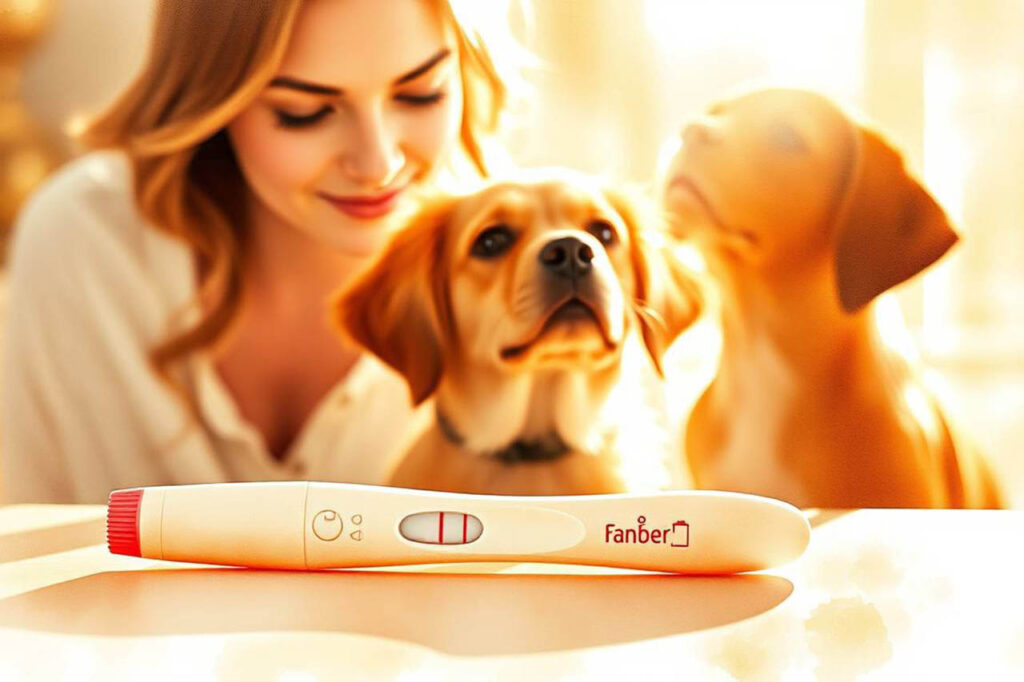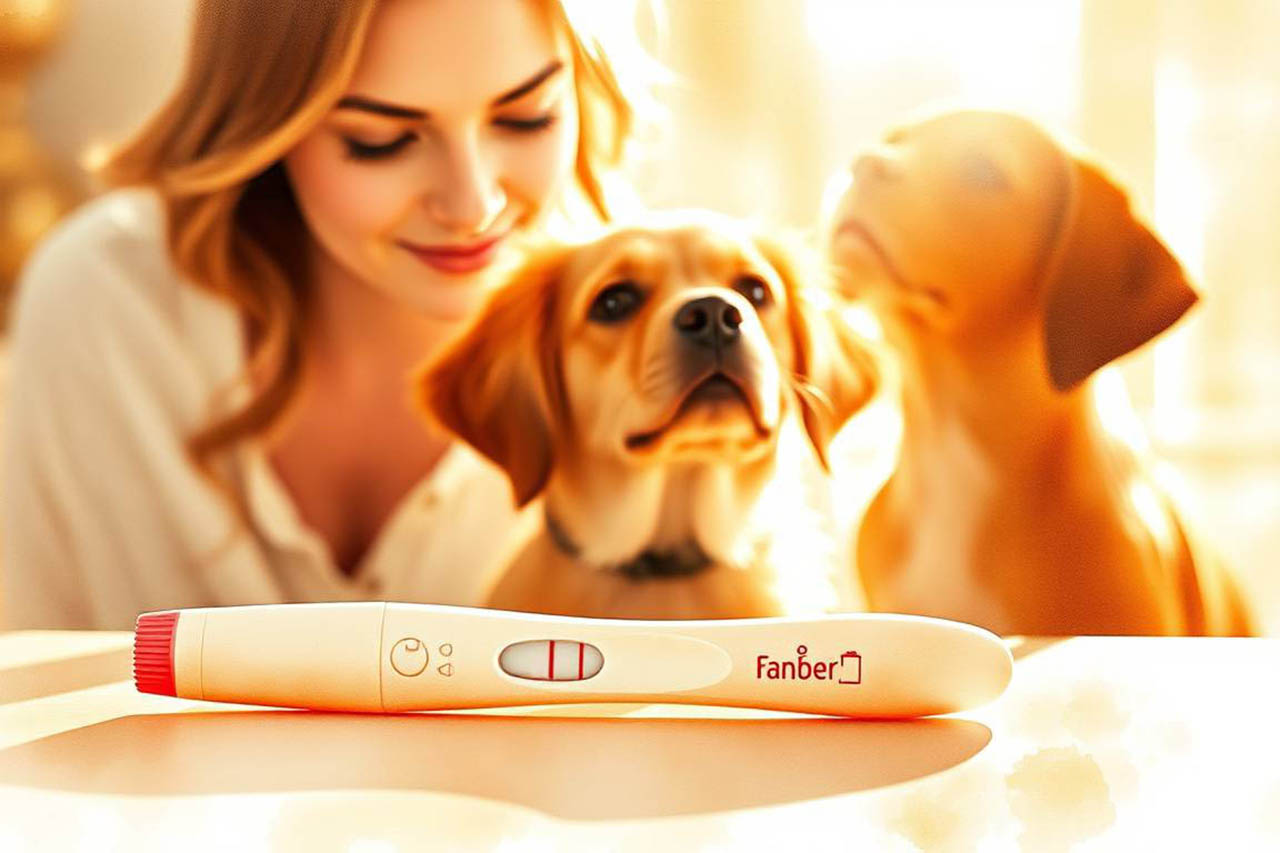Your cart is currently empty!
Do Human Pregnancy Tests Work on Dogs? Dog Pregnancy Tests Explained

If you’re a dog owner, you might be asking: “Is there a pregnancy test for dogs?” or even “Do human pregnancy test work on dogs?” The short answer? No—human tests don’t work for dogs. But don’t worry! In this guide, we’ll cover:
- Why human pregnancy tests fail for dogs.
- How dog pregnancy tests actually work (hint: they detect relaxin, not hCG).
- Where to get a reliable test and at-home options.
- Key signs of pregnancy in dogs.
Let’s dive in!
Can I Use Human Pregnancy Tests on Dogs or Cats?
Many pet owners think about using human urine pregnancy tests for their dogs, hoping for similar results. However, these tests do not work for canine pregnancy detection. The reason lies in fundamental biological difference: different hormones.
While human tests detect hCG (human chorionic gonadotropin), dogs and cats produce relaxin during pregnancy. Using a human urine pregnancy test on a dog or cat will give inaccurate readings, wasting time and money.
What Is Relaxin? Why the Human Tests do Not Work on Dogs and Cats
Since human tests don’t work, what does confirm pregnancy in dogs and cats? The answer lies in a hormone called relaxin.
Relaxin is a unique pregnancy hormone produced exclusively by the placenta in pregnant animals, with no equivalent in human pregnancy. Unlike humans who rely on hCG detection, dogs, cats, and other mammals produce relaxin following embryo implantation.
So relaxin testing specifically detects this animal-exclusive hormone, unlike human tests that target human chorionic gonadotropin (hCG) hormone, which is only specific to humans. Therefore, pet tests focus solely on relaxin. This allows earlier detection than ultrasounds (by day 21-25) and is more accurate than physical signs.
The fact that the human body does not produce relaxin and animals do not produce hCG explains why human pregnancy tests don’t work for pets – these entirely different hormones require completely separate testing methods, making relaxin-based veterinary tests essential for dogs.
What Does Relaxin Do?
- Produced by the placenta after embryo implantation (as early as 22–25 days post-breeding).
- Softens ligaments to prepare the body for birth.
- Confirms pregnancy when detected in blood (unlike hCG in humans).
Bottom line: If you suspect your dog is pregnant, skip the pharmacy aisle and opt for a rapid dog pregnancy test instead.

How Dog and Cat Pregnancy Tests Work
Now that we know relaxin is the key, how do dog pregnancy tests function?
Vet Clinic Blood Tests
- Detects relaxin – works earlier than ultrasounds or X-Ray
CONS:
- Performed at a vet clinic – requires vet visit, which might be stressful for your pet
- Expensive compared to home tests.
Lab-processed kits require collecting & mailing a blood sample.
- Detects relaxin – works earlier than ultrasounds or X-Ray
CONS:
- Takes time compare to home tests.
- More expensive compared to home tests.
Ultrasound or X-Ray
- Ultrasound – detects puppies around day 28–35.
- X-ray – best for counting puppies later in pregnancy (after day 45).
CONS:
- Works on progressed stages of pregnancy – does not work on easy stages.
- More expensive compared to home tests.
At-Home Dog Pregnancy Tests (Blood Based)
- Detects relaxin – works earlier than ultrasounds or X-Ray
PROS:
- Performed at home using blood sample – less stressful as the in-clinic test.
- More accurate than urine tests – the ratline accuracy of the A-PET-CARE relaxin test is 96.8% (see the accuracy table below).
- Fast results – read the results in 5-10 min.
- Costs from $5.99 – compare to vet visit costs.
CONS:
- Requires blood sample – a syringe or lancet is needed to collect the blood
- Requires blood centrifuge – A-PET-CARE at home pregnancy test works only with serum or plasma sample. You will need a home blood centrifuge to separate the blood to serum and plasma.
The Accuracy Table of A-PET-CARE Dog and Cat Pregnancy Tests
| Test Type | Relative Sensitivity | Relative Specificity | Relative Accuracy |
|---|---|---|---|
| Canine Pregnancy Test (RLN): | 92.1% | 98.8% | 96.8% |
Fun fact: Some at-home dog pregnancy tests claim to detect relaxin in urine, but vet blood tests are far more accurate.
Where Can I Get At-Home Dog Pregnancy Test?
You can get A-PET-CARE at-home dog and cat pregnancy test here.
Note: “How much is a cat pregnancy test?” Our prices start from $5.99 per test depending on the pack size.

Pregnancy Signs in Dogs and Cats
Dogs
- Nipple enlargement (week 3-4)
- Appetite changes
- Abdominal enlargement
- Nesting behavior
Cats
- “Pinking up” of nipples (week 3)
- Abdominal swelling (week 5)
- Behavioral changes
- Appetite fluctuations
Key Note: These signs alone aren’t definitive—relaxin testing or vet ultrasound confirms pregnancy.
When in doubt, consult your vet for accurate results and care tips.
FAQ
Q: Can human tests work for dogs?
A: No – they detect the wrong hormone (hCG vs relaxin).
Q: When can I test my dog?
A: Blood tests work at 21-25 days; ultrasound after 28 days.
Q: Are at-home tests reliable?
A: A-PET-CARE blood-based dog and cat pregnancy tests show 96.8% accuracy.
Disclaimer
The information provided is for educational purposes only and should not replace professional veterinary advice. Test accuracy may vary based on proper sample collection, pregnancy stage and relaxin levels. Always consult your veterinarian for pregnancy confirmation and prenatal care. Product claims are based on manufacturer data; individual results may vary.



